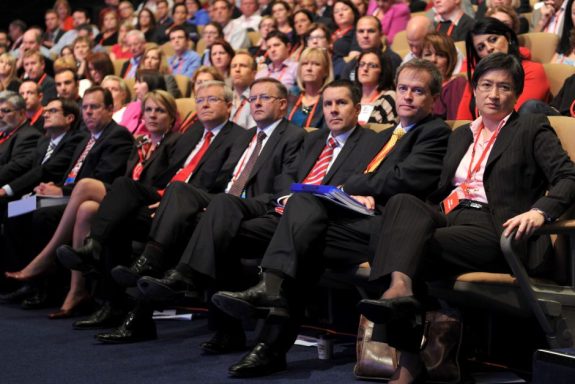Albanese vs Shorten vs Rudd vs the World (Cage Match)

For those of you wondering how it’ll work if the membership vote for one candidate and the Caucus vote for the other, it’s really quite simple. The votes will be weighted.
For example, if there were 5,000 members and 50 MPs. each 1000 of the membership’s votes would equal ten percent of the total vote, while each MP’s vote would equal one vote, meaning that if Albanese got 3000 votes from the members and 22 votes from the Caucus, he’d win.
This seems, on the face of it, to be a great process for “democratising” the party and encouraging membership, but there’s a couple of things that concern me.
The first is that it’s a very cumbersome process, and while Chris Bowen has been doing an admirable job warming the seat for someone else, it does seem strange that at a time when Labor should be focused on holding the newly elected Government to account, two of its senior members are in campaign mode and more focused on being elected Leader of the Opposition.
Secondly, while both Shorten and Albanese have conducted this initial ballot with grace and good manners, preferring to spruik their own credentials, rather than taking the “trash your opponent” model which has been popular with some in Australian politics, not all leadership contests will be quite so civilised.
We’ve already seen the destabilising effect of the Rudd/Gillard/Rudd situation. Even now, Labor people on social media are arguing about Gillard’s lack of “loyalty” and the “treachery” of Rudd.
Imagine if the Hawke/Keating changeover or the Rudd sacking had been attempted under this process. And while it’s true that this may have meant that neither would have happened, it may not always be a good thing that the party finds it impossible to depose a sitting Prime Minister.
To use a hypothetical example, imagine if a Prime Minister no longer has the support of his colleagues for reasons that have not become public.
After being told that, but he replies that he doesn’t care, he’ll still have the support of the party members, because he’s sure that his colleagues wouldn’t be prepared to bring these matters to public attention.
Yes, we can hope that the party has the courage to say, this is serious, we’ll take you on. But we know the reality of some of the occasions when public figures – not just politicians – have decided to resign for “personal reasons” or to “spend more time with the family”.
But my third reason is related to the way in which people think. There’s a lot of research to suggest that the “Age of Reason” hasn’t caught up with the human brain.
We think that we’re rational people, but ask a group of football fans about an umpiring decision, and I guarantee that there’ll be a bias, depending on which team a person supports.
Humans make many decisions quickly, and then spend the rational part of the brain justifying that decision.
Climate change is a perfect example, and I’m not suggesting that people don’t have a perfect right to be sceptical and to consider the evidence.
People who deny climate change are quick to latch onto any argument, however, inconsistent.
For example, Andrew Bolt recently attacked David Suzuki, suggesting that he had no “qualifications” in the area of climate science, but not having a degree in climate science (or anything else, given that Bolt, dropped out of University after a year) doesn’t stop Bolt from pontificating on the same subject.
Bolt’s also fond of quoting others whose expertise is in the area of physics, geology or public relations.
Climate deniers are quick to lap up Bolt’s points or the press release from an organization funded by the fossil fuel industry, while ignoring evidence from places like the CSIRO, claiming a vested interest.
What’s this got to do with a leadership battle?
Well, it worries me that if people are asked to vote for which candidate they’d prefer as Labor leader, it may end up creating a “bias” in their brain. “I voted for Smith, therefore, he’s the best candidate, so I’m really annoyed that Jones won. Jones is useless.”
Or even, the “halo effect”*, “I voted for Jones and he won, so he was the best candidate, and if he says that we should all do this, then, of course, he’s right”.
The Rudd versus Gillard arguments that have raged for the past three years is an example of what I mean.
My suspicion is that when people are asked to actually make a decision, it’ll make it worse.
At the moment, I don’t much care who leads the Labor Party, the Greens, Palmer’s United Party or One Nation. I simply want an effective Opposition holding Abbott to account and not allowing the media blackout that seems to be occurring.
If I was asked to vote, I worry that my vote would influence the way I see things.
But then, I guess that’s an argument against the whole democratic process.
*The Halo Effect Wikipedia The halo effect or halo error is a cognitive bias in which one’s judgments of a person’s character can be influenced by one’s overall impression of him or her. It can be found in a range of situations from the courtroom to the classroom and in everyday interactions. The halo effect was given its name by psychologist Edward Thorndike; subsequent researchers have studied it in relation to attractiveness and its bearing on the judicial and educational systems.
Like what we do at The AIMN?
You’ll like it even more knowing that your donation will help us to keep up the good fight.
Chuck in a few bucks and see just how far it goes!
Your contribution to help with the running costs of this site will be gratefully accepted.
You can donate through PayPal or credit card via the button below, or donate via bank transfer: BSB: 062500; A/c no: 10495969









